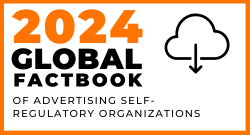An Appreciation of ICAS
Remarks of Lee Peeler *
As a consumer protection regulator with the US government, I always thought that advertising self-regulation worked well, remarkably well. Too much “self-regulation” had the deserved reputation of being cosmetic responses to an immediate crisis.
I wondered “why?” advertising self-regulation seemed so effective and sustained? After a little digging I concluded that advertising self-regulation reflected the unique confluence of events in the US during the late 1960’s and early 1970’s. During that period the US consumer protection movement had flowered. That movement questioned the fairness, usefulness and above all the truthfulness of advertising, especially national TV advertising – the new media of its day. This critical view of advertising was shared and amplified by a highly critical print and TV media, by many powerful members of the US Congress, and by a newly rejuvenated and aggressive US Federal Trade Commission. And the critical questioning of the social value of advertising coincided with ongoing legal and regulatory challenges to the then existing advertising self-regulatory structure that seemed more aimed at the protection of competitors from competition than at the protection of consumers from unfairness and deception. Finally, an exceptional generation of US ad industry leaders emerged, especially Howard Bell at the American Advertising Federation, who were willing to push advertising self-regulation despite a skeptical government and a wary industry. So, I concluded that the success of advertising self-regulation in the US reflected this unique confluence of events. In short, a “big bang” theory.
But, thanks to the opportunity to work with each of you as part of ICAS, I now know that this theory was off – that the answer to my question -“Why does advertising self-regulation work?”- was more complex.
From my work with you I learned that the type of principled self-regulatory structures, that I believed were unique to the US, exist around the world. In fact, I now know that the US system did not spontaneously generate but had borrowed heavily on the structure already created in the UK 1962 – the ASA, and so is actually an early example of the importance of ICAS’s members’ primary goal, supporting development of SRO’s in other economies.
I also came to understand that my “big bang” theory of causation was missing a large and critical element – the unique stake that the global advertising industry has in the ‘economics of trust” and how the need for more trustworthy advertising generates strong industry-based support for effective self-regulatory structures – for “real” self-regulation. Industry support is the oxygen of self-regulation.
What else have I learned?
That working together is always superior to working alone, both in terms of the product we produce and the enjoyment we get from producing it. In an increasingly global economy, each SRO system is faced with a common set of issues and there are real benefits to collaboration in finding the best answers. This need for collaboration will only increase and the need for ICAS will only grow more and more important in the coming years.
That one of these common challenges is financial. The funding challenge we all face reflects an inherent tension between balancing autonomy and independence with operational needs. And again, learning from each other, we can find better answers than alone.
But the most pleasant discovery is that advertising self –regulatory bodies around the world are blessed with smart, hardworking, public spirited staffs. Good people, doing good work, for a good cause.
As I move on from two really fun and fulfilling years as your ICAS President, I want to say how much I have learned from you and how much I have enjoyed working with you. As Tuesday’s ICAS/EASA roundtable demonstrated, there are many exciting issues before you, consumers and the advertising industry. The structure you have created in ICAS will be fundamental to meeting those challenges. We have built strong SRO systems but we also know we need to evolve rapidly or risk becoming irrelevant. ICAS can help ensure we do evolve.
During my career I have always been lucky to leave organizations with better leaders. And with Guy Parker on board as your presumptive President that will be true at ICAS as well.
Finally, we all at ICAS owe many, many thanks to ICAS’s Director Sibylle Stanciu-Loeckx. Sibylle stepped into the big shoes left by Soraya Belghazi just over a year ago. It has been a very tough year for everyone and Sibylle and Soraya before her have laid a strong foundation for the future success of ICAS. With Guy, Sibylle and your expanded Executive Committee, ICAS couldn’t be better poised to meet the challenges ahead.
*Lee Peeler served as President of ICAS from 2019 to 2021. He was CEO of the US Advertising Self- Regulatory Council from 2006 to 2019, Executive Vice President of the Council of Better Business Bureaus from 2006 to 2019 and Executive Vice President of BBB National Programs from 2019 to 2021. Lee joined advertising self-regulation after a 33 year career with the Bureau of Consumer Protection of the US Federal Trade Commission.

